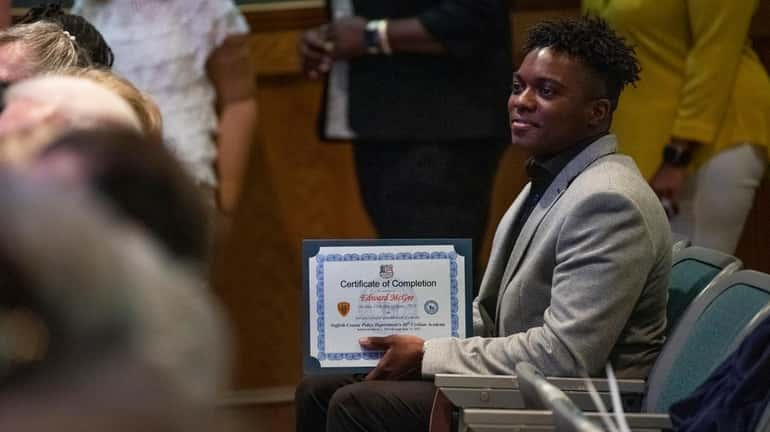43rd Civilian Academy Graduation June 13th 2024


Click for Patch Article
Newsday Civilian Academy Article
For civilian trainees, a Suffolk cop’s eye view of police work

By Keldy Ortizkeldy.ortiz@newsday.comUpdated June 26, 2022 11:39 pm
South Setauket resident Eddie McGee said he’s been subjected to name-calling by police and mistaken for a suspect in a crime, and yet, the interactions stoked his curiosity, which led to more questions.
McGee, who is Black, said that after his own encounters, and a string of high-profile killings of people of color in recent years, he wanted to get inside the minds of cops to gain insight into what they face on the street, and take what he learned and share it with the community.
The end result of his curiosity was displayed earlier this month when McGee, 30, joined 23 other Suffolk residents in the latest graduating class of the Suffolk County Civilian Police Academy in Brentwood.
McGee, who now hopes to become a community liaison with the Suffolk police department, said the 16-week course left him with a renewed respect for law enforcement because “you see firsthand what they have to do, what they have to go through and the situations they have to face. It’s not easy. It’s not easy for anybody.”
“I’m sure after these weeks of training that you’ve seen,” Harrison said, ” … there’s more of a level of respect for the men and women that do this profession.”
A closer look at police work came courtesy of Suffolk cops who taught the citizen trainees potential real-life scenarios when handling calls such as domestic violence and homicide investigations. Instructors discussed situations they have faced such as police-involved shootings. Trainees were also offered the opportunity to ride along with Suffolk police officers.
“When you get put in those situations and you have to make those split-second decisions, then you realize, ‘OK, maybe that wasn’t as easy’ ” as it appeared, McGee said.
The academy, which had its first official civilian class in 1993, is not typically a recruitment tool — participants are often over 34, the maximum age to take the police written exam, Suffolk police said. Of the participants, 17 were white, five Hispanic, four Black and one, a transgender woman.
Nassau police have a civilian academy that started in 1997 and offers a 15-week seminar.
A law enforcement expert said that while police civilian academies present the “police story” in a condensed way, “they’re essentially marketing tools.”
“To the extent that they do a job of portraying the reality of policing, that’s probably not a bad thing,” said Dennis Kenney, a professor at John Jay College of Criminal Justice. “The mission of reaching into communities that have distrust with the police and addressing those issues really would not be well suited for any kind of police academy arrangement. You need a different kind of forum to be able to engage in that.”
Past citizen academy classes also included Black people and other minorities, Suffolk Deputy Commissioner Risco Mention-Lewis said, and they have graduated from the class with a greater appreciation for police officers’ training and the challenges they face every day.
“Everybody who takes this class gets something out of it,” she said.
Alejandra Becerra, of Kings Park, joined the class because she has been interested in criminal justice and forensics. However, she said she couldn’t imagine working as a police officer because it’s “a very high-risk profession.”
“At least … I know even if I have a bad day, I know that I’ll always make it home,” said Becerra, 28, who works as a banker for Chase, adding that as a police officer, “you don’t know if you’re going to come home.”
With Michael O’KeeffeBy Keldy Ortizkeldy.ortiz@newsday.com
Join a Committee!






